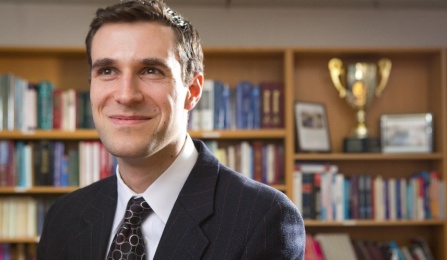Michael DiGiacomo, MD ’09

“By meeting and speaking with my patients, I’m able to gain a good understanding of them and can help them get on the right medications to relieve their symptoms.”
Michael DiGiacomo, MD ’09, was an English major who worked his way through college as a jazz saxophonist in a popular local band. He contemplated a career as a professional musician before deciding to enter UB medical school. At first he thought he wanted to become a surgeon, but an influential course during his second year turned him toward psychiatry.
“I loved hearing about the different disorders,” he recalls. “From there, I really liked the idea of sitting and talking with patients, trying to understand their thought process. In college I was really interested in studying characters in the novels I was reading. I thought that going into psychiatry would be an extension of being an English major.”
DiGiacomo describes a medical education that prepared him to immediately grasp hospital demands. “As soon as I started as an intern, I felt like I had a good sense of how to solve the problems that I needed to solve in the hospital. Maybe I didn’t know exactly what medications to give or exactly what intervention, but I had a good sense of how to get to that point.”
After three years of residency in the Department of Psychiatry at Erie County Medical Center, a UB teaching affiliate, he became chief resident and now helps supervise 25 young doctors. “My training here involves both psychotherapy and pharmacology and has been excellent,” he says. “By meeting and speaking with my patients, I’m able to gain a good understanding of them and can help them get on the right medications to relieve their symptoms.”
DiGiacomo feels that the new Center of Excellence for Behavioral Health Care at ECMC—a collaborative effort with Kaleida Health and UB—will have a great impact in a community with a severe shortage of psychiatrists. “As I go through residency, I get a lot of calls from people asking who’s a good psychiatrist and how they can be reached. The wait lists are long. Families in crisis often don’t know where to bring their family members. I think that having a center here through the university will be a great resource for the community and for our students.”
A clinical rotation on the adolescent unit during his second year of residency sparked an interest in child psychiatry. After graduation from residency in June, DiGiacomo begins a two-year fellowship at UB that will prepare him to practice as a clinical child and adolescent psychiatrist.
“There aren’t a lot of child psychiatrists right now. There’s a need for more,” says DiGiacomo, who intends to stay and practice at home in Western New York.
